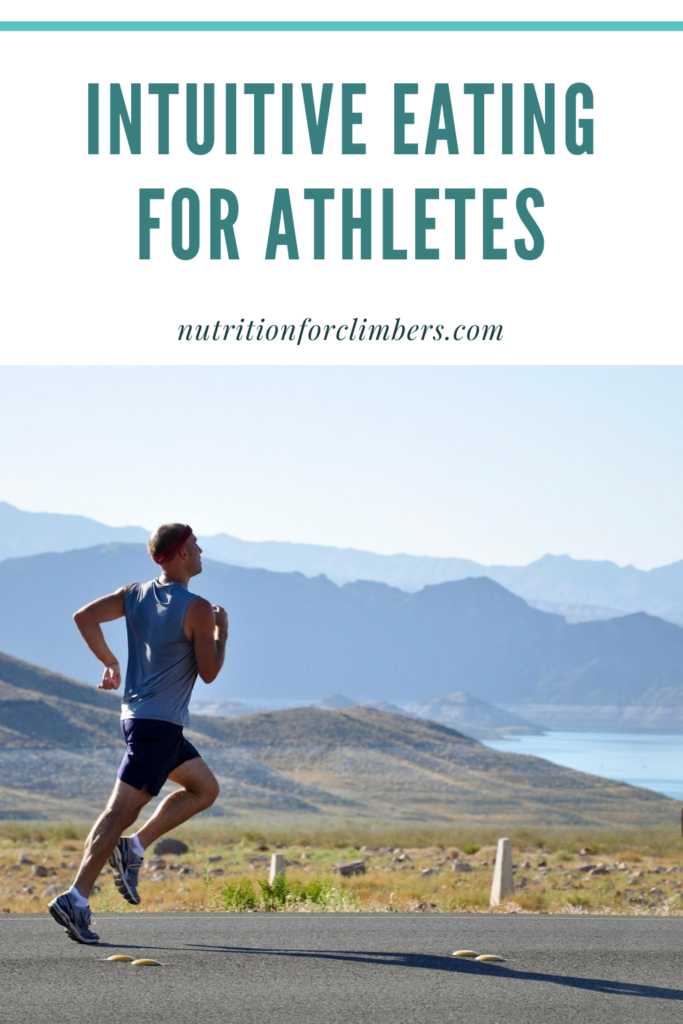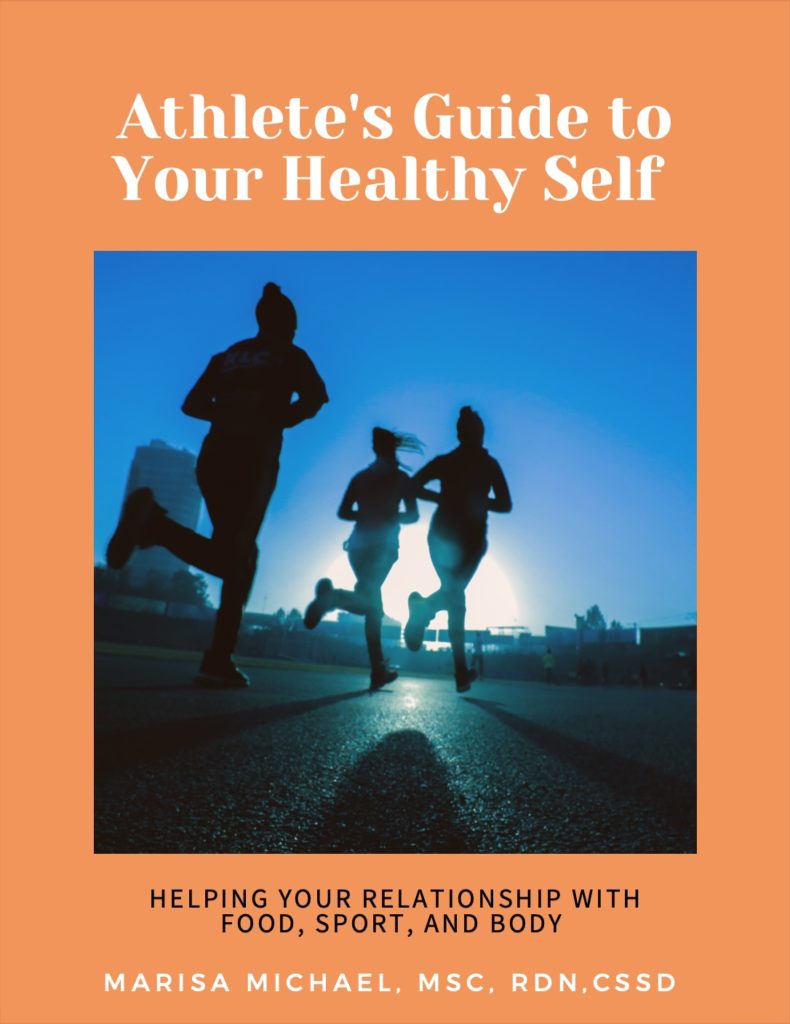Follow her on Instagram

While intuitive eating has become an ever rising concept in the nutrition field, I often come across the myth that this approach could not work in the athletic population due to the strict dietary guidelines athletes often face. As a dietitian with a passion for the non-diet approach and performance nutrition, I decided to dig a little deeper to explore the idea of merging the two. Before we dive into how we can unify these nutrition philosophies, we first need to understand what intuitive eating is.
Intuitive Eating Explained
While it is hard to explain intuitive eating “in a nutshell”, the founders describe it as “a self-care eating framework, which integrates instinct, emotion, and rational thought”. In other words, intuitive eating is an approach to eating that honors your health by listening to the messages your body sends to meet physical and psychological needs; essentially encouraging you to be the expert of your own body. An intuitive approach is not focused on weight, calorie goals, or any other external rules that may dictate how we choose to eat and firmly rejects any kind of diet mentality. So, let’s explore how this could apply to athletes!
How Dieting Affects Athletes
As I mentioned above, athletes are often faced with strict, rigid, dietary guidelines to improve performance and/or physical appearance. Oftentimes, however, this can lead to the athlete taking in inadequate energy to meet the needs of their sport and tends to lead to obsessive, unhealthy thoughts around food. While athletes may not be engaging in dieting behaviors specifically for appearance reasons, we still often see restrictive diets with the goal of improved performance, improved health, or improved physical appearance for judgement based sports. What many athletes don’t realize until it’s too late is what dieting really gives them:
- Increased anxiety/depression
- Decreased performance and recovery
- Increased injury
- Difficulty focusing
- Suppressed immunity
Due to those strict guidelines, it may seem as though the flexible approach of intuitive eating could not tie into performance nutrition. However, because athletes are at a much higher risk of eating disorders and disordered eating, intuitive eating may be the perfect approach to combat this.
Merging Intuitive Eating and Performance Nutrition
To fully understand how this approach can be applied to athletes, I think it is most helpful to go through each principal of Intuitive Eating.
- Reject the Diet Mentality
As I mentioned above, engaging in diet behaviors can have detrimental effects on both performance and overall physical and mental health. It is important to note that to be fully engaged in intuitive eating, one must fully give up any kind of dieting and weight-focused goals. In the process of rejecting the diet mentality, one needs to trust their body to know what is best and understand why strict, rigid, restrictive diets cause more harm than good.
- Honor Your Hunger
For the general population, this principle is just what it sounds like-listening to your hunger and keeping your body biologically fed. For athletes, this one can get kind of tricky. When performing in a physically demanding sport, you may feel hungry A LOT, in which case it is extremely important to listen and respond to those cues. On the other hand, many athletes might also find themselves with a suppressed appetite, particularly post exercise. In this case, you may have to get more curious about those hunger cues and listen for the more subtle signals such as:
- Thinking about food
- Difficulty concentrating
- Fatigue
- Fogginess
- Moodiness
- Headaches
- Poor performance/energy in training
- Make Peace With Food
For both athletes and the general public, food rules can be super common as a result of dieting/diet culture. In order to fully be able to listen to your body and adequately fuel yourself, one needs to first neutralize all foods and remove any type of good/bad label or morality. When we are still restricting certain foods, it will lead to feelings of deprivation, resulting in intense cravings and often bingeing, further convincing us that we cannot “trust ourselves” with these foods. When you are able to view all foods as morally equal, that food loses its power and you are able to eat it when you want without shame, guilt, or urges to overeat.
- Challenge The Food Police
Diet culture can often convince athletes that they need to be fearful of certain foods or food groups. Along with making peace with food, you need to actively challenge the “food police” voice in your head that tells you what you can or can’t eat and instead listen to the signals your body is giving you.
- Feel Your Fullness
Again, this one is about as it sounds. It is important to listen to the signals your body sends to tell you it is finished eating. In order to do this, however, your body needs to trust that it will be given the food it needs and desires consistently. Athletes often can find themselves eating to the point of overly full from eating excessively large meals due to inadequate fueling during the day. It is important to focus on adequate intake before and after training to avoid getting overly hungry and overeating at meal times.
- Discover the Satisfaction Factor
Along with eating enough, it is super important to eat foods that are satisfying both physically and mentally. When you allow yourself to eat what you really want, when you want it, your body will be truly satisfied after meals and be able to eat just the right amount before it tells you it has had enough. When trying to restrict cravings, you will likely find yourself still wanting to eat even when physically full, because your brain and body are not actually satisfied.
- Honor Feelings Without Food
While I do not consider emotional eating to be inherently bad, as athletes you can find yourself under a lot of stress and anxiety, sometimes leading to lack of appetite and sometimes leading to eating as a coping mechanism. It is important to reduce the shame and guilt around emotional eating and work with a professional to discover other coping skills to manage those feelings aside from food. It can be helpful to get curious about why you are turning to food. If food is helping, great! If you are using food to numb or ignore the problem, you may want to explore ways to better cope and get to the root of the problem.
- Respect your Body
This one can be tough, especially for athletes. Respecting your body means accepting your genetic blueprint. It means trusting that when you are eating and moving in a way that promotes health and performance, your body will naturally settle at the weight that feels best for it and where it can optimally perform. Often, athletes can fall into the trap of thinking a smaller body is a healthier, better performing body (although, we can see this isn’t true by looking at the effects of dieting on athletes). By respecting your body’s natural, set point weight as well as the natural diversity of all bodies, it takes away a lot of the stress and pressure to need to control it and frees up so much brain space to focus on more important things in your life.
- Exercise-Feel the Difference
For athletes, the concept of joyful movement looks a little different. While you may need to stick to a training regime, it is still important to be able to listen to your body and know when to dial it back or take a rest day. I firmly believe that athletes can and should still move in a way that is intuitive by allowing flexibility in their training to listen to what their bodies need. Rigidity and inability to rest are warning signs that your relationship with your sport may be becoming disordered. Work on exploring why you enjoy your sport as well as recognizing your identity outside of it. Even as athletes, your sport and training should be an enjoyable experience, not adding stress to your life.
- Honor Your Health With Gentle Nutrition
This is where your nutrition knowledge comes into play. As athletes, it is necessary to be getting enough of what you need and at the right times. This principle involves pulling in your knowledge of the macro and micro nutrients to make sure you are getting everything you need pre, during, and post training while also including a wide variety of all foods (including fun foods!).
Key Points to Intuitive Eating
Athletes are often told they need to be extremely rigid in both their eating and training habits, counting every calorie or macro and giving 100% in training every day. In truth, this mindset is what puts athletes at a higher risk for eating disorders and disordered eating. This diet mindset and chronic restriction can lead to decreased performance, higher rates or injury, and increased rates of anxiety and depression. Intuitive eating can and should be applied to performance nutrition to teach athletes how to listen to their bodies messages, respect their set weight, and allow flexibility in their eating habits to reduce the obsessive and unhealthy relationships with food.
More resources you might like:



~This is general information only and not medical advice. Always consult with your healthcare professional before undergoing any diet or lifestyle change.
